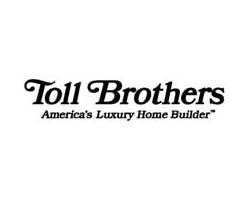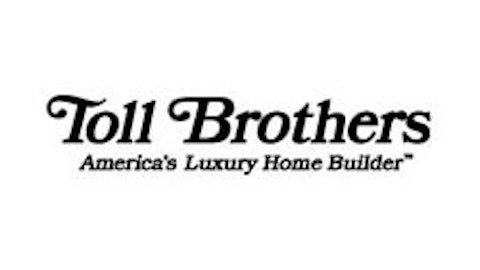Since the beginning of August, the market has turned sour on a number of housing-related stocks, as investors fear that rising interest rates will hurt sales. As usual, Mr. Market is taking the short-term view and ignoring the bigger picture. Interest rates are up 38% this year, but we are still in historic low-rate territory.
How historic? If rates get to 5% in the near future, per Freddie Mac, 30-year mortgages would still be cheaper than they’ve been since before 1971. That’s more than 42 years since rates were this low. Add in the continual recovery of the U.S. economy, and the picture isn’t a bleak as the short-term outlook has made it appear.
But just because Mr. Market is putting much of the sector on sale doesn’t mean that all of housing is a buy – as the following three companies demonstrate.

High-end housing with a high-end valuation
While overall housing affordability is falling, the segment of the market that Toll Brothers Inc (NYSE:TOL) targets – luxury housing – is less affected by rising prices and interest rates. The bottom line is that wealthier home buyers aren’t as likely to be priced out of the market. To the contrary, rising rates could create incentive for some of them to take the plunge sooner rather than later, as Toll Brothers Inc (NYSE:TOL)’s 6% sales increase in June suggests.
Still, June’s good news only represents one month’s results. The bigger picture for Toll Brothers Inc (NYSE:TOL) includes a strong position in land holdings in urban areas, where it can market its more upscale properties to a larger population.
CEO Douglas Yearley said in the Q3 earnings release:
We remain focused on growing our company. This quarter our land position grew to 47,200 lots from 45,200 last quarter and 39,200 one year ago. We expect our community count – 225 at third quarter-end – to remain stable through the end of FY 2013 and to grow by 10% to 15% by FYE 2014.
Toll Brothers Inc (NYSE:TOL) also has a solid backlog of $2.4 billion in customer orders, with a cancellation rate of less than 5% on average in recent quarters. This strength could indicate continued growth.
However, there is some question about Toll’s valuation, especially with Q3’s earnings report showing EPS down 27% year over year. Its forward P/E ratio is nearly 40, even with shares down nearly 16% from their 2013 high. This could be a good time to start a small position in Toll, then add to it over time – but only if we see strong earnings growth over the next few years.
Not adding on
Back in June, I was flat wrong about this one. Trex Company, Inc. (NYSE:TREX) promised investors close to 10% growth this year, and as recently as May, it reiterated this guidance. However, resultswere well short of expectations, coming in at meager 4.5% increase.
Net non-GAAP EPS increased more than 50% to $0.86. While that still makes Trex Company, Inc. (NYSE:TREX) a clearly profitable company, it still disappointed a market that expected $1 per share instead.
And while the market has punished shares to the tune of nearly 12%, even with a recent rally, there is still strong reason not to rush in and fill up your portfolio. Trex Company, Inc. (NYSE:TREX) reduced guidance for the rest of the year to only 2% revenue growth, and essentially flat sales year over year.
Trex Company, Inc. (NYSE:TREX) is a cyclical business, doing a large part of its business in the spring and early summer. Even with the recent share price drop, the company is priced like a growth stock, with a trailing P/E ratio of more than 48. I still have faith in the company’s management – this is the team that turned the company around – but until it restarts that growth, Trex Company, Inc. (NYSE:TREX) is no bargain buy.
Great home value, reasonable valuation
Meritage Homes Corp (NYSE:MTH), however, is growing both sales and income at an impressive rate – more than 50% revenue growth, and an astounding 320% earnings-per-share growth for the most recent quarter. And like Toll Brothers Inc (NYSE:TOL), Meritage Homes Corp (NYSE:MTH) has done a solid job of managing its land inventory, carrying what it estimates at 4.7 years worth of land, having added 3,500 new lots over the quarter.
With a trailing P/E of less than 11, and a forward P/E ratio near 15, shares are borderline cheap. That’s especially true when one considers that since bottoming out in 2011, the company has grown revenues more than 80%. Yet even with that growth, revenue and EPS are still less than half what they were at the peak of the market in 2006.
Let’s be clear: Investors shouldn’t aim for performance that equals the peak of an irrational real estate market. However, it’s worth looking back to see how far the housing market – and Meritage Homes Corp (NYSE:MTH) – have come since the bubble burst. By most measures, there’s still plenty of room to grow in a sustainable way.
Closing thoughts
Mortgage rates are still at historic lows, and housing is still relatively affordable, even with recent price increases. The economy keeps eking out growth and adding more jobs. As these trends continue, homebuilders and companies that support the housing market will benefit.
As for the three companies discussed here, Meritage Homes Corp (NYSE:MTH) looks most attractive. Toll Brothers Inc (NYSE:TOL) has a great target market and position, but shares are borderline expensive, even with the recent price drop. Trex Company, Inc. (NYSE:TREX), however, just isn’t giving investors the growth it’s priced for, and with the deck building season in the rearview mirror till next spring, now may not the best time to buy.
The article Housing Is Recovering, but Are These Housing Stocks Buys? originally appeared on Fool.com and is written by Jason Hall.
Jason Hall owns shares of Trex and Meritage Homes. The Motley Fool recommends Meritage Homes and Trex. The Motley Fool owns shares of Trex.
Copyright © 1995 – 2013 The Motley Fool, LLC. All rights reserved. The Motley Fool has a disclosure policy.



